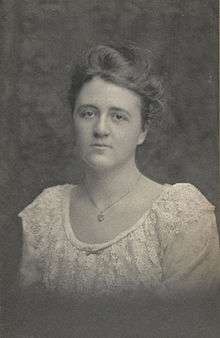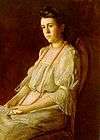Beatrice Fenton
| Beatrice Fenton | |
|---|---|
 Beatrice Fenton, c.1910 | |
| Born |
1887-07-02 Philadelphia, Pennsylvania |
| Died |
1983-02-11 Philadelphia, Pennsylvania |
| Nationality | American |
| Education |
School of Industrial Art Pennsylvania Academy of the Fine Arts Moore Institute of Art |
Beatrice Fenton (July 12, 1887 – February 11, 1983) was an American sculptor and educator born in Philadelphia, Pennsylvania.[1] She is best known for her whimsical fountains.
Early life and education
Beatrice Fenton was born on July 12, 1887 in Philadelphia, Pennsylvania to Thomas Hanover and Lizzie Spear (Remak) F.
Inspired by the painter Rosa Bonheur, she decided to become an animalier and began drawing animals at the Philadelphia Zoo. Her father, Dr. Thomas Hanover Fenton, an art patron and head of the Art Club of Philadelphia, was impressed with the drawings and showed them to a family friend, Thomas Eakins. Eakins found the drawings “too flat” and suggested that she “get some clay and mold it.” Fenton enrolled in a sculpture class taught by A. Stirling Calder in 1903, and her future direction was set.[2] She began her studies in 1904 at the School of Industrial Art, where she was taught by Alexander Stirling Calder. From 1904 to 1912, she studied with Charles Grafly at the Pennsylvania Academy of the Fine Arts in Philadelphia.[3]
Career
Fenton succeeded Samuel Murray as Instructor in Sculpture at the Moore College of Art and Design (formerly the Philadelphia School of Art for Women), teaching there from 1942 to 1953.[4]
Works by Fenton were shown at PAFA's annual exhibition most years from 1911 to 1964,[5] and she was awarded the George D. Widener Memorial Gold Medal in 1922 for Seaweed Fountain.[6] She was a member of the National Sculpture Society, and her Nereid Fountain was featured in the NSS exhibition of 1929.[7] A cast of Seaweed Fountain has been in the Brookgreen Gardens collection since 1934.[8]
She died in Philadelphia in 1983.
Selected works
 The Coral Necklace: Portrait of Beatrice Fenton (1904), by Thomas Eakins, Butler Institute of American Art, Youngstown, Ohio.
The Coral Necklace: Portrait of Beatrice Fenton (1904), by Thomas Eakins, Butler Institute of American Art, Youngstown, Ohio. Seaweed Fountain (1920–22), Brookgreen Gardens, Murrell's Inlet, South Carolina.
Seaweed Fountain (1920–22), Brookgreen Gardens, Murrell's Inlet, South Carolina. Evelyn Taylor Price Memorial Sundial (1947), Rittenhouse Square, Philadelphia, Pennsylvania.
Evelyn Taylor Price Memorial Sundial (1947), Rittenhouse Square, Philadelphia, Pennsylvania.
Personal life
While studying at PAFA, Fenton met fellow artists Marjorie Martinet and Emily Clayton Bishop. Her relationship with Martinet lasted more than fifty years, and included the exchange of passionate letters.[9][10]
References
- ↑ "Beatrice Fenton papers, 1836-1984". Archives of American Art. Smithsonian Institution. Retrieved 11 May 2016.
- ↑ James-Gadzinski, Susan; Cunningham, Mary Mullen (1997). American sculpture in the Museum of American Art of the Pennsylvania Academy of the Fine Arts. Seattle: University of Washington Press. p. 225. ISBN 978-0295976921.
- ↑ Rubinstein, Charlotte Streifer (1990). American women sculptors : a history of women working in three dimensions (1st ed.). Boston, MA: G.K. Hall. p. 159. ISBN 9780816187324.
- ↑ Opitz, Glenn B., ed. (1986). Mantle Fielding's dictionary of American painters, sculptors & engravers (2nd ed.). Poughkeepsie, NY: Apollo. ISBN 978-0938290049.
- ↑ The Annual Exhibition Record of the Pennsylvania Academy of the Fine Arts, Peter Hastings Falk, ed. (Sound View Press, 1989), vol. II, p. 194; vol. III, p. 181.
- ↑ In the Garden, from Conner- Rosenkranz
- ↑ National Sculpture Society (U.S.); California Palace of the Legion of Honor (1929). Contemporary American sculpture : the California Palace of the Legion of Honor, Lincoln Park, San Francisco, April to October 1929. New York, New York: National Sculpture Society, New York : Press of the Kalkhoff Company.
- ↑ Proske, Beatrice Gilman (1968). Brookgreen Gardens Sculpture. Brookgreen Gardens. p. 244.
- ↑ "Photographs of the Marjorie Martinet School of Art". George Glazer Gallery.
- ↑ Fitzgerald, Jean. "A Finding Aid to the Beatrice Fenton Papers, 1836-1984, bulk 1890-1978, in the Archives of American Art by Jean Fitzgerald". Archives of American Art.
External links
- Beatrice Fenton at Find a Grave
- Photographs of the Marjorie Martinet School of Art, George Glazer Gallery, New York City
- A Finding Aid to the Beatrice Fenton Papers, 1836-1984, bulk 1890-1978, in the Archives of American Art, by Jean Fitzgerald